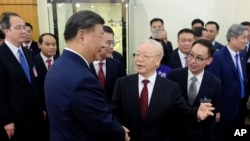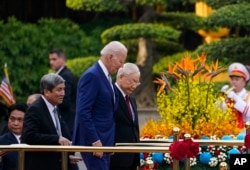Vietnamese General Secretary Nguyen Phu Trong has hailed improved relations with the U.S. and China as significant gains in the country's "bamboo" diplomatic strategy of balancing ties with superpowers.
Last year, Vietnam hosted U.S. President Joe Biden and Chinese President Xi Jinping little more than three months apart, moving closer in relationships with the top two powers — both of which want to court Vietnam, according to experts interviewed by VOA.
Between these two moves, Vietnam elevated Japan to one of its six comprehensive strategic partners, along with the U.S. and China.
When addressing the 32nd National Diplomatic Conference on December 19 in Hanoi, Trong said Vietnam's diplomatic tradition is deeply ingrained with the essence of Vietnamese bamboo, which has "firm roots" and "flexible branches," reported VCCI News.
Vietnamese diplomacy, according to the party leader, should be adaptive and flexible, aligning with the core tenets of "firm in objectives, flexible in strategies and tactics."
“Flexible” for balancing
The idea of "bamboo diplomacy" was first coined by Trong in 2016 following his reelection to lead Vietnam's Communist Party for the second time. Vietnam has actively pursued this diplomatic approach to navigate rising global tensions since 2021.
The policy is exemplified by Vietnam's careful balancing act. It shares concerns with the U.S. over Beijing's growing assertiveness in the disputed South China Sea, but it has significant economic links with China.
Following an unprecedented double upgrade of its relationship with the U.S. in September, Vietnam committed to developing a "shared future" with China in December.
"In a world where great powers are constantly competing, and in a world with an uncertain future, it is evident that Vietnam has created certain successes, especially in maintaining and keeping the balance between two great powers who are competing so fiercely," Hoang Viet, a Ho Chi Minh City Law University lecturer and international dispute expert, told VOA.
Lawyer Dang Dinh Manh, who is following Vietnamese politics while living in exile in the U.S., said that after their upgrades with Hanoi, the U.S. and Japan "are reassured that Vietnam is not too inclined toward China, while the Chinese side is affirmed that Vietnam continues to be in the orbit in the name of friendship with big brother China."
Hoang Viet, also an expert on China's South China Sea expansion, said Vietnam had to accept participation in a "community of shared future" with China so as not to upset Beijing and maintain the diplomatic space to establish deeper cooperation with the U.S., Japan and other Western countries for economic development purposes.
"Vietnam was most afraid of adverse reactions from China when it comes to upgrading relations with the U.S. and Japan," said Hoang Viet. "The U.S. had pushed Vietnam for the relationship elevation for a long time, and Vietnam had to choose a right time for it. Otherwise, it will face anger from China."
During Xi's visit, Hanoi and Beijing signed 36 cooperation documents in areas such as infrastructure, trade and security. They also published a joint declaration outlining broad pledges.
Carl Thayer, a professor at the University of New South Wales, branded the declaration as "window dressing," saying Vietnam is "giving lip service" to Chinese ideas like its Belt and Road Initiative and its "Community of Shared Future."
"It doesn't cost [Vietnam] anything," Thayer, an expert on Vietnam, told VOA. "They are not making a firm stand, and they're giving the impression that they are supporting, or at least not opposing."
Trade is an important part of Vietnam's balancing strategy. The United States, a former enemy of Vietnam, has become its greatest export market for goods, while China is its largest import market.
Following the establishment of new relations with the U.S. and China, Vietnam, as an increasingly strategic player in global supply chains, is projected to see a large influx of foreign capital.
Jensen Huang, CEO of chipmaker Nvidia, visited Hanoi last month and told domestic media that he aimed to set up a base in Vietnam. Meanwhile, the Southeast Asian country is seeing a wave of Chinese firms arriving.
Neutral in a polarized world
Although bamboo diplomacy has served Vietnam well in the face of superpowers' competition for influence and investment, analysts have warned of limits to Vietnam's neutral approach.
"Bamboo diplomacy is really about Vietnam maintaining its autonomy and independence and not becoming aligned," said Thayer. "But now the world is more polarized than ever, and it's going to make it more and more difficult, I think, to stay out of it."
Vietnam's White Paper 2019 stated that the country is pursuing a nonaligned policy known as "Four No," which means no military alliances; no siding with one country against another; no foreign military bases; and no use of force or threat to use force in international relations.
Vietnam chose to refrain from condemning Russia's invasion of Ukraine and voted against suspending Russia, Hanoi's largest arms supplier and longtime ally, from the U.N. Human Rights Council.
"Vietnam, in the sense, will lose some credibility by not speaking out on human rights issues," Thayer said, adding that "the case of Russia and Ukraine was a prime example."
According to Alexander Vuving, a professor at the Hawaii-based Asia Pacific Center for Security Studies, the growing chasm between the West on the one hand and China and Russia on the other, will make this approach ever trickier for Vietnam.
"'Bamboo diplomacy' won't provide a sustainable way for Vietnam to cope with the vagaries of Cold War 2," Vuving told VOA, adding that Vietnam needs "a new 'safety net' suitable for the new conditions of the times."
Similarly, Vu Duc Khanh, a law professor at the University of Ottawa who follows Vietnamese politics, questioned whether Vietnam could retain neutrality in the face of increasingly fierce competition between superpowers.
"The war in Ukraine has changed the entire strategy of countries like Finland, Sweden and Denmark," Khanh said.
Finland and Sweden applied to join NATO in response to Russia's invasion of Ukraine, while Denmark, a founding member of NATO, signed a defense basing agreement with the U.S. last month.
On the same note, Thayer said he believed "Vietnam is going to find it's hard" if the wars in Ukraine and Gaza intensify the competition between the U.S. and China.
Other potential stumbling blocks
"The Biden administration could be replaced by Trump's. Or the American Congress might get angry with Vietnam on particular issues. Or Vietnam's position will be an impediment to improving bilateral relations with the United States," said Thayer.
According to Hoang Viet, Vietnam is watching to learn these lessons against the backdrop of its confrontation in the South China Sea with China.
"For now, Vietnam, as well as Southeast Asian countries, are trying not to take sides as long as it's possible for them," said Hoang Viet. "Vietnam will maintain this policy until they cannot do it anymore."
Last month, General Secretary Trong anticipated that global and regional dynamics would be "complex and unpredictable."
He warned that "in a multipolar, multicentered world, strategic competition among major nations is inevitable, with heightened risks of conflict and confrontation posing significant challenges for developing countries."
He urged Vietnamese diplomats to keep a careful eye on the situation to make accurate forecasts and "be persistent yet flexible" in diplomacy.






